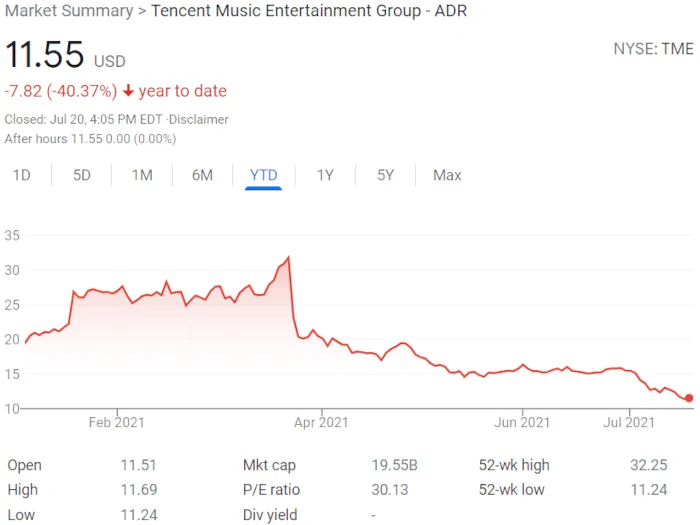Tencent Music stock (NYSE: TME) has parted with about 41 percent of its value since 2021’s start, prompting some investors to speculate about the downturn’s causes and their significance with regard to the stock’s long-term performance.
When the market closed today, Tencent Music stock was worth $11.55 per share, a figure that reflects an even 1.4 percent boost on the day. Nevertheless, TME has dipped by north of 11 percent during the last week, approximately 24 percent during the last month, 56 percent during the latter six months (shares were hovering around $30 apiece through most of Q1 2021), and roughly 41 percent since 2021’s beginning, as mentioned.
Worth noting at the outset is that these stock-price declines arrived despite the fact that the company – consisting of the QQ Music, Kugou Music, and Kuwo Music streaming services as well as the WeSing karaoke app – reported a 42.6 percent YoY paid-subscriber increase (to 60.9 million premium accounts) in its Q1 2021 performance breakdown. Revenue increased 24 percent YoY during the same period, to $1.22 billion, according to the document, and the company’s Q2 2021 financials are scheduled to release on Monday, August 16th.
Perhaps the most obvious contributor to the value falloff of Tencent Music stock is the threat of an imminent “antitrust” penalty from the Chinese government. A report in late April suggested that China’s State Administration for Market Regulation (SAMR), after fining Alibaba a staggering $2.8 billion, would issue a $1.5 billion fine to Tencent – and order the company to sell off several Tencent Music divisions.
Subsequently, however, additional reports indicated that the conglomerate wouldn’t face a forced selloff or a multibillion-dollar fine, instead paying closer to just $77,000 and, more significantly, giving up the exclusive rights to some music. Shenzhen-headquartered Tencent Music has long touted its library of exclusive works, and parting with the corresponding rights could well affect its ability to attract subscribers and stay ahead of the competition. (As a pertinent aside, the SAMR hasn’t yet announced Tencent’s penalty.)
Next, Goldman Sachs downgraded Tencent Music stock in late March – in addition to executing $10.5 billion in block trades, selling off $6.6 billion worth of Baidu, Tencent Music, and Vipshop Holdings, according to Bloomberg.
Morgan Stanley – which had upped its Tencent Music stake to nearly 100 million shares in February – also sold off a substantial portion of its TME interest, causing Tencent Music to unveil a $1 billion stock-repurchase program. And more recently, Morgan Stanley analyst Alex Poon downgraded the rating of Tencent Music stock to “equalweight” and established a $14 target price (down from $23). The financial professional cited long-term revenue concerns, the aforementioned loss of exclusive music licenses, and slowing advertising income in explaining the bearish stance.
Finally, the Pomerantz Law Firm announced in a recent release that it “is investigating claims on behalf of investors of Tencent Music.” Though said release is relatively light on details concerning the nuances of this inquiry, it does relay that “the investigation concerns whether Tencent and certain of its officers and/or directors have engaged in securities fraud or other unlawful business practices.” The announcement followed the May of 2021 dismissal of a separate investor lawsuit centering on Tencent Music’s IPO.


